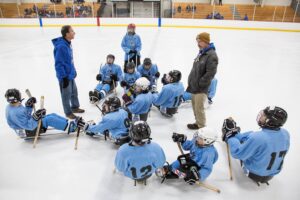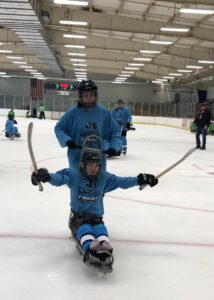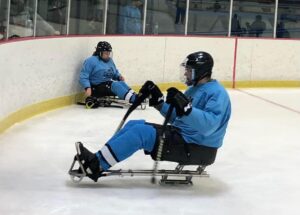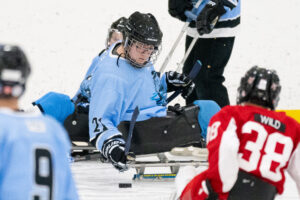
Spina Bifida Awareness Month: Stories from STAR Athletes

October is Spina Bifida Awareness Month! At STAR Center, we are committed to advocating for, supporting, and raising awareness about Spina Bifida. Approximately 170,000 individuals in the United States live with this condition. Many organizations and support groups provide resources aimed at enhancing the quality of life for families and individuals affected by Spina Bifida. In the La Crosse area, STAR Center serves numerous individuals with Spina Bifida, offering opportunities for them to engage in sports and connect with others. A few participants have kindly shared their experiences with the STAR community, and we would like to share their stories! A huge thank you to Addison, Sevanna, and Wyatt for taking the time to touch on some of the topics and helping advocate for Spina Bifida awareness month!
What is Spina Bifida?
Spina Bifida is a neural tube defect that occurs when the spinal column fails to develop or close properly, impacting the spinal cord and nerves. This typically happens within the first 28 days of pregnancy when the neural tube is forming. Symptoms can vary widely depending on the type and severity, and may include mobility challenges, muscle weakness, bladder and bowel issues, and learning disabilities.
Types of Spina Bifida
The three common types of Spina Bifida include:
- Spina Bifida Occulta: The mildest form, usually causing little to no symptoms.
- Meningocele: In this type, the protective coverings of the spinal cord (meninges) protrude through the spinal opening, but the spinal cord remains in place.
- Myelomeningocele: The most severe form, where the spinal cord and nerves are exposed through the opening, leading to various symptoms.
Athletes Stories
At STAR, we are dedicated to spreading awareness and fostering an inclusive community where we can provide resources, make connections, and share stories. A few of our athletes have shared insights from their personal experiences with Spina Bifida.
Experiences Living with Spina Bifida
When asked about positive experiences or strengths gained from living with Spina Bifida, Addison mentioned the joy of being part of an amazing community and participating in adaptive sports through STAR Center. Sevanna highlighted her experience at Spirit Camp, where attendees with Spina Bifida could connect with staff who also have Spina Bifida, creating a powerful role model environment and connection. In discussing challenges, Wyatt pointed out that the number of surgeries he underwent often limited his ability to participate in activities with friends.

STAR Center has provided enjoyable opportunities for individuals to stay active through various para sports. Participants have experienced numerous benefits, whether it’s through sled hockey, wheelchair tennis, wheelchair basketball, strength and conditioning, or wheelchair football. These activities help athletes meet new people, enhance their skills, and maintain an active lifestyle.
Support
Support for individuals with disabilities can come in many forms, depending on factors such as age and personal circumstances. The definition of support can also vary based on individual perspectives. Healthcare professionals provide resources, medical supplies, and advocacy, while family and friends offer strength, courage, and patience to help overcome barriers associated with Spina Bifida. Addison expressed that support from his circle has empowered him to “take chances and push myself when I think I can’t go any further and to speak up for myself when needed.”
Communities and Organizations
Various organizations and communities offer resources, activities, and networks for individuals with Spina Bifida to connect and learn from one another. Wyatt spoke about a camp he attended for nine years and hopes to become a camp counselor at, one day. He remarked, “Seeing people who are just like myself really makes me feel like I’m not alone,” illustrating the profound impact of these communities. Addison shared that he participates in several Reddit communities, where he connects with others who have disabilities, allowing him to share his story and learn from different experiences.
Experiences in School and Work
At school, support from teachers and other staff members made all the difference for these athletes’ experiences. Sevanna shared her positive experiences with teachers that were understanding and supportive. Being a part of extracurricular activities throughout school had a positive impact on these athletes, specifically track for Wyatt, where he was the first wheelchair athlete at Logan High School. Addison went on to attend Northeast Iowa Community College, where supportive professors inspired him to pursue a career in IT.
As these individuals transition to the workforce, challenges can arise. Sevanna took time to focus on her health after working in a daycare. Wyatt is now attending Western Technical College for college courses while working at the Boys and Girls Club in La Crosse. Addison faced barriers when job hunting due to accessibility issues but has since secured a remote position in an IT related field. With the support from family, teachers, and other support systems, these individuals are exploring and learning on their occupational path.
Advocating
Sharing personal experiences helps spread awareness and educate others about disabilities. Addison emphasized the importance of advocating for legislation that impacts the disabled community, such as H.R. 7138 (the SSI Restoration Act of 2024) and S. 2767 (the Savings Penalty Elimination Act). He encourages others to contact their representatives to support these crucial bills.
Misconceptions about Spina Bifida can also be challenging. Sevanna noted that some people assume “everyone has the same issues,” while Wyatt pointed out that using a wheelchair does not mean someone is incapable of doing things that able-bodied individuals can do.
Accomplishments
 When reflecting on their proudest achievements, Wyatt highlighted his status as a four-time state qualifier in track, earning a podium spot in every event. Sevanna celebrated being the first wheelchair track athlete in Tomah in 2018, breaking records and pushing boundaries. Addison expressed pride in receiving his driver’s license and his Associate of Applied Science in computer science, networking, and programming, demonstrating resilience and determination. Looking ahead, Sevanna hopes to live independently and improve her hockey skills, particularly in lifting the puck when shooting. Addison aspires to live independently and pursue a fulfilling career.
When reflecting on their proudest achievements, Wyatt highlighted his status as a four-time state qualifier in track, earning a podium spot in every event. Sevanna celebrated being the first wheelchair track athlete in Tomah in 2018, breaking records and pushing boundaries. Addison expressed pride in receiving his driver’s license and his Associate of Applied Science in computer science, networking, and programming, demonstrating resilience and determination. Looking ahead, Sevanna hopes to live independently and improve her hockey skills, particularly in lifting the puck when shooting. Addison aspires to live independently and pursue a fulfilling career.
Hopes for the Spina Bifida Community
While awareness and research continue to grow, there is still much work to be done for the Spina Bifida community. Their hopes include gathering resources, spreading knowledge, creating understanding, and enhancing ADA and universal access.
A huge thank you to Sevanna, Addison, and Wyatt for sharing their stories and experiences with Spina Bifida. We are grateful to have you as part of the STAR Center community and look forward to continuing our advocacy efforts for individuals with Spina Bifida.
Written By: Emma Zibble
